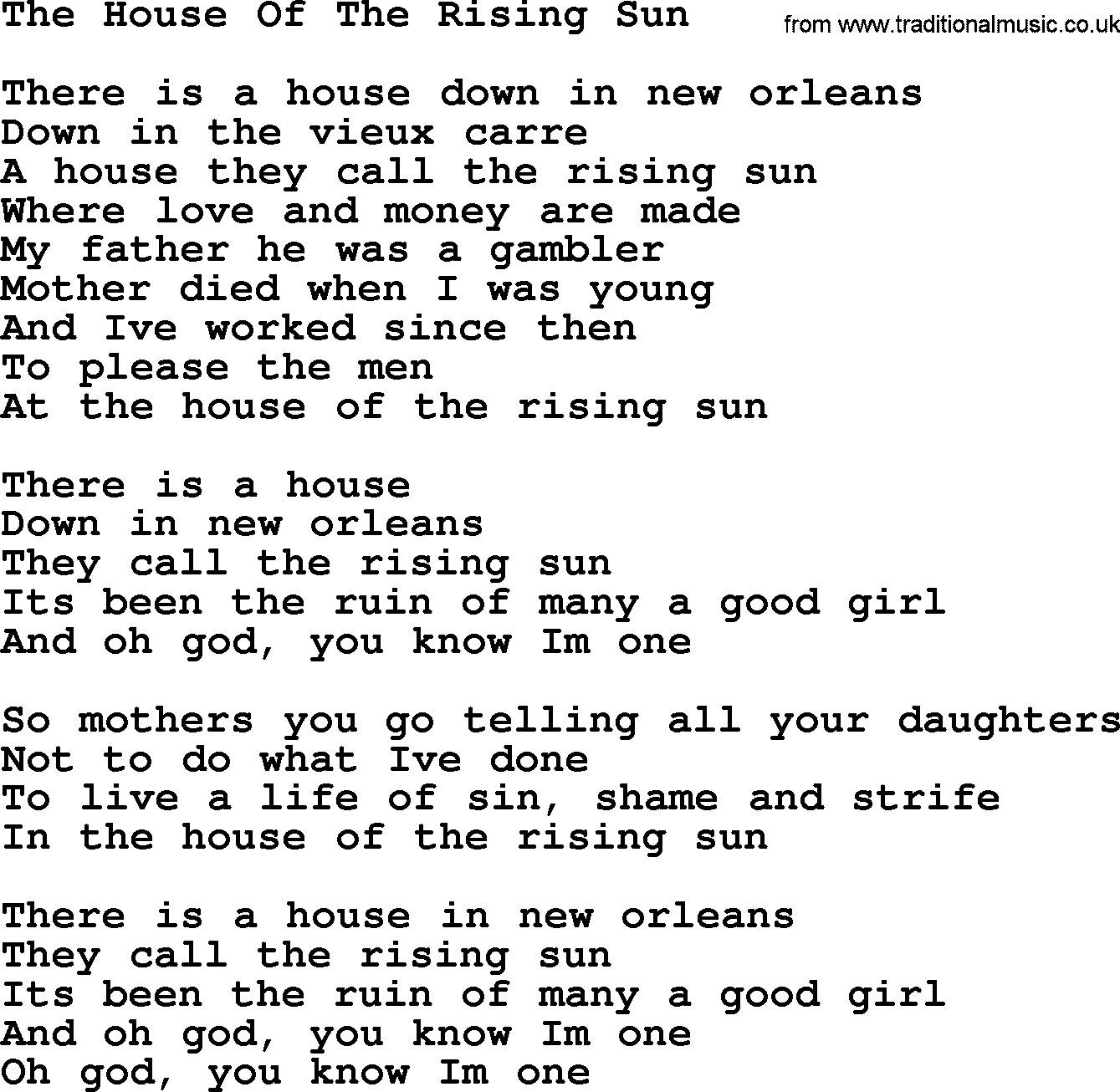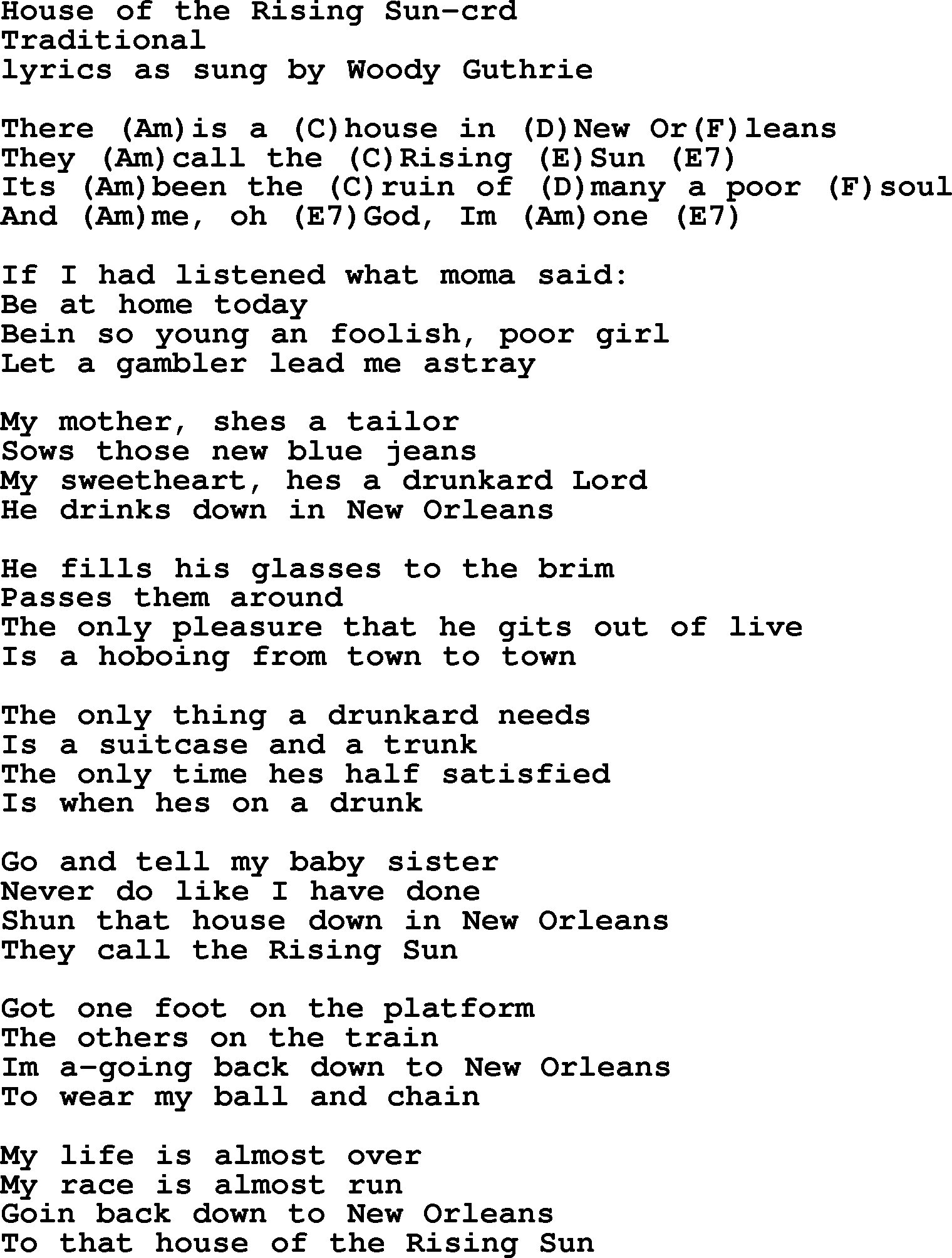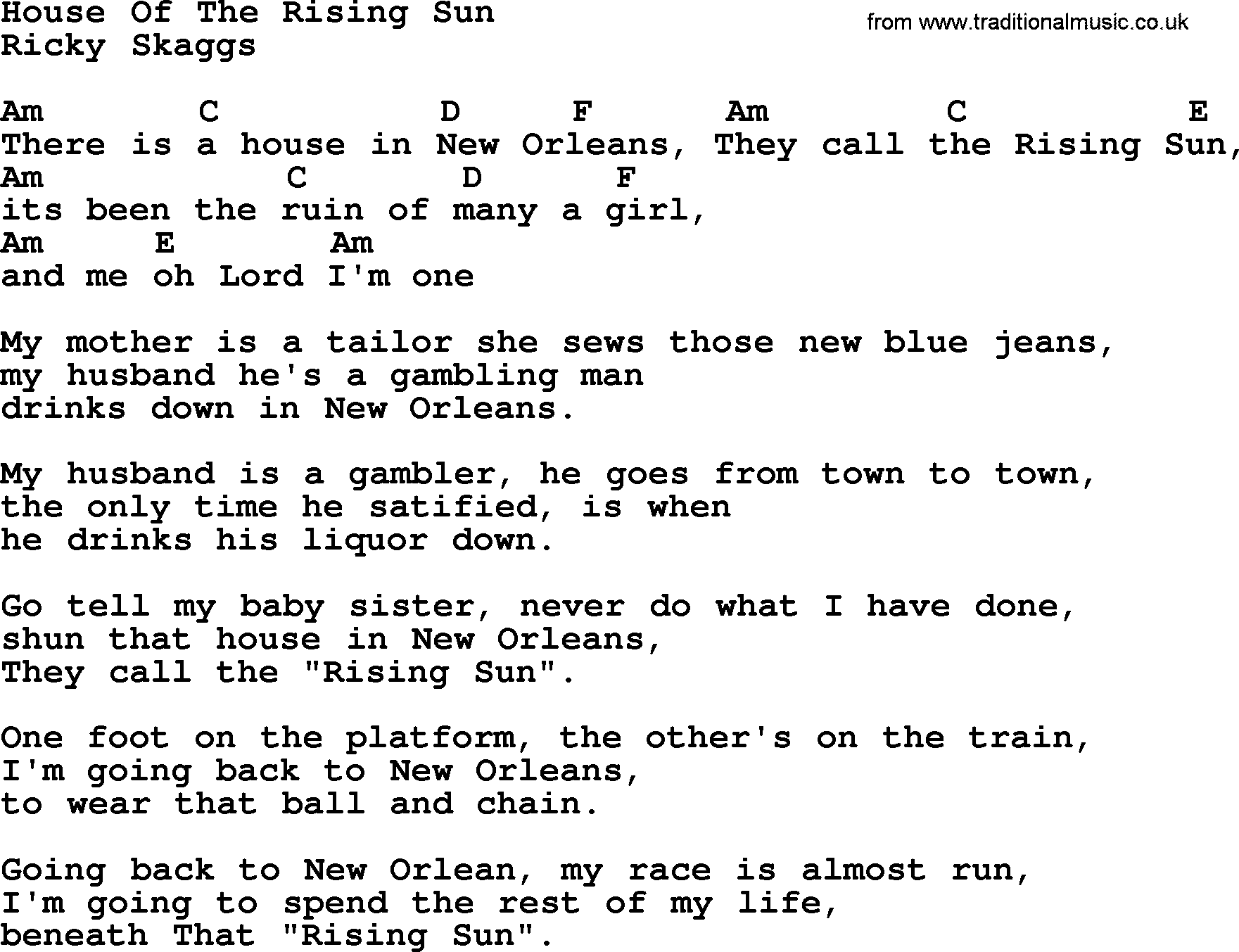Decoding "House Of The Rising Sun Lyrics": A Journey Through Folk History
Few songs possess the enigmatic allure and enduring power of "House of the Rising Sun." Its haunting melody and poignant "House of the Rising Sun lyrics" have captivated generations, weaving a narrative of despair, regret, and the inescapable grip of a life gone astray. This iconic track, famously popularized by the British rock band The Animals, is far more than just a catchy tune; it's a centuries-old American folk ballad that has traversed continents and countless interpretations, each adding a new layer to its mysterious charm.
From its murky origins in the oral tradition of American folk music to its electrifying transformation into a global rock anthem, the story behind "House of the Rising Sun" is as compelling as the song itself. It's a tale of evolution, adaptation, and the timeless human struggle against temptation and fate. Join us as we delve deep into the history, meaning, and profound impact of these legendary lyrics, exploring why they continue to resonate with listeners across the globe.
Table of Contents
- The Enduring Mystery of "House of the Rising Sun"
- Tracing the Roots: From Traditional Folk to American Blues
- The Animals' Iconic Rendition: A Game Changer
- Unpacking "House of the Rising Sun Lyrics": A Deep Dive
- Songwriters, Publishers, and the Question of Authorship
- The Cultural Impact and Enduring Legacy
- Beyond "Rising Sun": The Animals' Other Hits
- Why "House of the Rising Sun Lyrics" Still Captivate Us
The Enduring Mystery of "House of the Rising Sun"
At the heart of the song's enduring appeal lies its central enigma: what exactly is the "House of the Rising Sun"? The phrase itself is often understood as a euphemism for a brothel, a place of ill repute where lives are squandered and futures are lost. This interpretation aligns with the song's grim narrative of a life of ruin. However, the true nature of the house remains shrouded in mystery. Is it a gambling den, a prison, a reform school, or perhaps even a fictitious place, a symbolic representation of vice and despair? Commentators and historians have debated this for decades, with no definitive answer emerging.
The lyrics paint a vivid picture of its destructive power: "and it's been the ruin of many a poor boy and god, i know i'm one." This line, central to the "House of the Rising Sun lyrics," immediately establishes the song's somber tone and the narrator's lament. The "rising sun" itself, while seemingly a symbol of new beginnings, takes on a darker connotation here. It could symbolize temptation, the dawn of a life of vice, or even a cyclical return to a place of degradation, a sun that rises only to illuminate one's downfall. This ambiguity allows the song to transcend a single meaning, making it relatable to anyone who has faced the consequences of poor choices or systemic misfortune.
Tracing the Roots: From Traditional Folk to American Blues
Before it became a global rock hit, "House of the Rising Sun" existed as a traditional American folk tune, its origins stretching back potentially to the 19th century. Like many folk songs, it was passed down through oral tradition, evolving with each singer and region. This meant there was no single, definitive version; lyrics and melodies shifted, adapting to local nuances and personal experiences. Early recordings and interpretations began to emerge in the early 20th century, cementing its place in the American folk music canon.
Musicians like Clarence "Tom" Ashley and Gwen Foster recorded versions in the 1930s, often under titles like "Rising Sun Blues." The song was a staple for folk revivalists, with notable renditions by Lead Belly, Woody Guthrie, and Joan Baez. Bob Dylan famously included a version on his debut album in 1962, though he later admitted he learned it from the arrangement by folk singer Dave Van Ronk. These early versions often featured different lyrical details and musical arrangements, but the core narrative of a life ruined in New Orleans remained constant. The song served as a powerful lament, a cautionary tale sung by the marginalized, reflecting the harsh realities of poverty, gambling, and vice in the American South.
- La Doble Vida De Mi Esposo Multimillonario
- Billie Jean Lyrics
- Coraline In Theaters
- Fraunces Tavern
- Feliz Navidad Meaning
The Animals' Iconic Rendition: A Game Changer
While the song had a rich history, it was The Animals' 1964 rendition that catapulted "House of the Rising Sun" into the global consciousness. The British rock band, known for their gritty blues-rock sound, transformed the acoustic folk ballad into an electrifying rock anthem. Their version, recorded in a single take, was a masterclass in arrangement and performance. Eric Burdon's raw, soulful vocals imbued the "House of the Rising Sun lyrics" with a newfound intensity, conveying the narrator's despair with visceral power.
Crucially, Alan Price's iconic organ solo became the song's signature element. His arpeggiated chords and haunting melody provided a dramatic, almost cinematic backdrop to Burdon's voice, elevating the track beyond a simple folk cover. This innovative arrangement, combined with Chas Chandler's driving bass and John Steel's steady drums, created a sound that was both timeless and revolutionary for its era. The Animals' version topped charts worldwide, becoming a classic British pop song and a cornerstone of the British Invasion. It not only defined The Animals' career but also demonstrated the power of folk music when reinterpreted through a contemporary rock lens, introducing the "House of the Rising Sun lyrics" to millions who had never heard of its folk roots.
Unpacking "House of the Rising Sun Lyrics": A Deep Dive
The true power of "House of the Rising Sun" lies in its narrative and the vivid imagery painted by its lyrics. While deceptively simple, these "House of the Rising Sun lyrics" tell a complex story of fate, family, and the seductive pull of a destructive lifestyle. Let's break down the core elements of this compelling narrative.
The Narrative Core: A Tale of Ruin and Regret
The song immediately introduces a mysterious place, one so infamous it has a name: "There is a house in New Orleans they call the Rising Sun." The narrator, reflecting on their own downfall, confesses, "and it's been the ruin of many a poor boy and god, i know i'm one." This opening sets a somber, confessional tone, indicating that the story is a cautionary tale from someone who has experienced the "House's" destructive power firsthand. The narrator is trapped, caught between a past they regret and a future that offers little hope, encapsulated by the line: "well, i got one foot on the platform the other foot on the train i'm goin' back to new orleans to wear that ball and chain." This imagery evokes a sense of inescapable destiny, a return to the very place that caused their undoing, now bound by the consequences of their actions.
The Character's Plight: Mother, Father, and the Gambler's Life
The "House of the Rising Sun lyrics" then delve into the narrator's family background, suggesting that their unfortunate path was perhaps inherited or influenced by their upbringing. "My mother was a tailor, she sewed my new blue jeans; my father was a gamblin' man down in New Orleans." This contrast is stark: a hardworking mother trying to provide, versus a father consumed by vice. The description of the father is particularly poignant: "now the only thing a gambler needs is a suitcase and trunk and the only time he's satisfied is when he's on a drunk." This paints a picture of a transient, unstable life, driven by addiction and the fleeting highs of gambling. The narrator's subsequent plea, "oh mother, tell your children not to do what i have done," serves as a desperate warning, a cry from the depths of regret, hoping to spare others from a similar fate. It highlights the cyclical nature of poverty and addiction, passed down through generations, making the "House of the Rising Sun lyrics" a powerful social commentary.
Gender Shift: Boy vs. Girl Narrator
One of the fascinating aspects of "House of the Rising Sun lyrics" is the fluidity of the narrator's gender across different versions. While The Animals' iconic rendition features a "poor boy," many traditional folk versions, particularly earlier ones, tell the story from a female perspective. In these versions, the lyrics might be: "It's been the ruin of many a poor girl, and god, i know, i'm one." The female narrator often laments being led astray by a "gambling man" (or "husband"), as in: "My husband, he's a gambling man, (drinks) down in New Orleans."
This shift in gender significantly alters the interpretation of the "House of the Rising Sun." If the narrator is a girl, the "House" is almost certainly a brothel, and her ruin is tied to prostitution. If it's a boy, the "House" could be a gambling den, a prison, or even a general symbol of a life of crime and debauchery. The Animals' decision to adopt the male perspective was largely pragmatic – Eric Burdon was a male singer – but it broadened the song's appeal and its interpretation, making the themes of ruin and regret more universally applicable beyond a specific gendered experience.
Symbolism Beyond the Literal
Beyond the literal narrative, the "House of the Rising Sun lyrics" are rich with symbolism. New Orleans itself is more than just a setting; it's a character in its own right. Known for its vibrant music, unique culture, and historical reputation for both revelry and debauchery, the city perfectly embodies the dual nature of the "House"—a place of allure and danger. It's a city where one can easily lose oneself, for better or for worse.
The "rising sun," as mentioned earlier, is a powerful symbol. While typically associated with hope and new beginnings, in this context, it takes on an ironic or even ominous meaning. It could represent the dawn of a life of vice, the perpetual cycle of addiction and despair, or even the moment of realization when one understands they are truly trapped. The "ball and chain" is a direct metaphor for imprisonment, whether literal or figurative, signifying the inescapable consequences of the narrator's actions. These layers of symbolism are what elevate the "House of the Rising Sun lyrics" from a simple folk song to a timeless piece of art that invites contemplation and introspection.
Songwriters, Publishers, and the Question of Authorship
One of the most complex aspects of "House of the Rising Sun" is its authorship. As a traditional folk song, it emerged from a collective oral tradition, meaning there isn't a single, original songwriter. Over the decades, countless musicians adapted and performed it, each adding their own touch. This makes crediting the song a challenge, leading to various interpretations and, at times, legal disputes over publishing rights.
When The Animals recorded their version, the arrangement was credited to Alan Price, their keyboardist, who reportedly based it on an arrangement by folk singer Josh White. However, the song's traditional nature meant that the songwriting credit was often listed as "Traditional, arranged by [artist]." For The Animals' version, the initial publishing rights and arrangement credit went to Alan Price, which later caused friction within the band, as the song's immense success led to significant royalties. Eventually, the credit was often shared, or the song was listed as "Traditional" with a specific arrangement credit. This situation highlights the unique challenges of copyrighting and publishing traditional folk music, where the lines between creation, adaptation, and performance can become blurred. Commentators' notes on the "House of the Rising Sun lyrics" often delve into these historical complexities, adding another layer to the song's rich backstory.
The Cultural Impact and Enduring Legacy
The Animals' rendition of "House of the Rising Sun" didn't just become a hit; it became a cultural phenomenon. Its raw energy and evocative "House of the Rising Sun lyrics" resonated deeply with audiences, particularly during the turbulent 1960s. It bridged the gap between traditional American folk music and the burgeoning rock and roll scene, proving that ancient narratives could be given new life through contemporary instrumentation and performance. The song's success played a significant role in introducing blues and folk elements to a mainstream pop audience, influencing countless artists across various genres.
Its enduring legacy is evident in its continued presence in popular culture. "House of the Rising Sun" has been featured in numerous films, television shows, and commercials, often used to evoke a sense of gritty realism, despair, or a journey into the unknown. Its haunting melody and universal themes of regret and consequence make it a timeless choice for dramatic storytelling. From its humble beginnings as an American folk tune to its status as a global rock anthem, the song has transcended its origins to become a permanent fixture in the collective musical consciousness, proving the timeless power of its narrative and the unforgettable impact of its "House of the Rising Sun lyrics."
Beyond "Rising Sun": The Animals' Other Hits
While "House of the Rising Sun" remains The Animals' most recognizable and enduring hit, their discography is rich with other powerful songs that cemented their reputation as one of the most influential bands of the British Invasion. Their ability to infuse blues and R&B with a distinct rock edge was evident in many of their subsequent releases. Tracks like "Don’t Let Me Be Misunderstood" showcased Eric Burdon's emotive vocals and the band's tight instrumentation, becoming another global success that explored themes of misinterpretation and alienation.
"We Gotta Get Out of This Place" became an anthem for working-class youth, its urgent plea for escape resonating with a generation seeking change and opportunity. This song, like "House of the Rising Sun," captured a sense of entrapment and longing for a better life. Their cover of Sam Cooke's "Bring It On Home to Me" further demonstrated their prowess in interpreting classic R&B, bringing their unique blend of raw energy and soulful delivery to a wider audience. These songs, while distinct from "House of the Rising Sun," collectively showcased The Animals' musical versatility and their knack for selecting and performing material that spoke to universal human experiences, solidifying their place in rock history.
Why "House of the Rising Sun Lyrics" Still Captivate Us
Decades after its most famous rendition, the "House of the Rising Sun lyrics" continue to captivate audiences worldwide. Its enduring appeal lies in a powerful combination of elements: a haunting, instantly recognizable melody, a deeply human narrative, and a sense of timeless mystery. The song speaks to universal themes that transcend specific eras or locations: the allure of forbidden places, the consequences of poor choices, the weight of regret, and the cyclical nature of misfortune. Whether interpreted as a literal brothel, a gambling den, or simply a metaphor for a life gone wrong, the "House" remains a potent symbol of temptation and downfall.
Furthermore, the sheer power of The Animals' performance, particularly Eric Burdon's raw vocal delivery and Alan Price's iconic organ solo, ensures its place in the pantheon of classic rock. It's a song that evokes strong emotions, drawing listeners into its melancholic world. Its adaptability, having been reinterpreted by countless artists across genres, also speaks to its inherent strength and the timelessness of its core message. The "House of the Rising Sun lyrics" are not just words; they are a lament, a warning, and a reflection on the human condition, making it a song that continues to resonate with profound depth and emotional resonance.
Conclusion
From its enigmatic beginnings as a traditional American folk tune to its explosive transformation into a global rock anthem by The Animals, "House of the Rising Sun" stands as a testament to the enduring power of storytelling through music. The "House of the Rising Sun lyrics," steeped in themes of ruin, regret, and the inescapable grip of fate, have resonated across generations, painting a vivid picture of a life consumed by vice in the shadowy corners of New Orleans. Its mysterious setting, the poignant tale of a "poor boy" or "poor girl" trapped by circumstance, and the raw emotion conveyed in its various renditions ensure its place as a timeless classic.
The journey of "House of the Rising Sun" is a fascinating exploration of musical evolution, cultural impact, and the universal human experience of confronting one's past. It reminds us that even the simplest melodies can carry the weight of profound narratives, speaking to the deepest parts of our shared humanity. What are your thoughts on the meaning behind the "House of the Rising Sun lyrics"? Have you heard other compelling versions? Share your insights in the comments below, and consider exploring other classic folk and blues songs that have shaped our musical landscape.
- The Senators Son Full Movie
- Harris Dickinson
- Ozark Empire Fair
- Where Can I Watch One Tree Hill
- Mpac Morristown Nj

Dolly Parton song: The House Of The Rising Sun, lyrics

Woody Guthrie song - House Of The Rising Sun, lyrics and chords

Ukulele Chords House Of The Rising Sun at Nicholas Barrallier blog